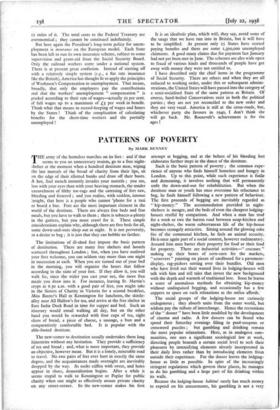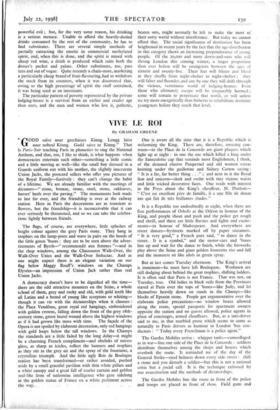PATTERNS OF POVERTY
By MARK BENNEY
THE army of the homeless marches on its feet : and if that seems to you an unnecessary truism, go to a free night- shelter at the moment when a hundred destitute men, wiping the last 'morsels of the bread of charity from their lips, sit on the edge of their allotted bunks and draw off their boots. A hot, foul stench instantly invades your nostrils ; you see, less with your eyes than with your heaving stomach, the tender unravehnent of filthy toe-rags and the caressing of feet raw, bleeding and festered ; and you realise, with sudden, intense insight, that here is a people who cannot 'phone for a taxi or board a bus. Feet are the most important element in the world of the destitute. There are always free beds and free meals, but you have to walk to them ; there is tobacco a-plenty in the gutters, but you must crawl for it. These simple considerations explain why, although there are free beds for all, some down-and-outs sleep out at night. It is not perversity, or a desire to beg ; it is just that they can hobble no farther.
The limitations of ill-shod feet impose the basic pattern of destitution. There are many free shelters and hostels scattered throughout London ; but, when you have outlived your first welcome, you can seldom stay more than one night in succession at each. When you are turned out of your bed in the morning, you will organise the hours that follow according to the state of your feet. If they allow it, you will walk far, since the wider you cast your net, the more free meals you draw into it. For instance, leaving St. Martin's crypt at 6.3o a.m. with a good pair of feet, you might take in the Sisters of Charity in Victoria for a second breakfast, Miss Baxter's Hall in Kennington for luncheon, the skittle- alley near All Hallow's for tea, and arrive at the free shelter in East India Dock Road in time for supper and bed. Such an itinerary would entail walking all day, but on the other hand you would be rewarded with four cups of tea, eight slices of bread, a piece of cheese, a sausage, a bun and a comparatively comfortable bed. It is popular with the able-footed destitute.
The new-comer to destitution usually undertakes these long itineraries without any hesitation. They provide a sufficiency of tea and bread ; and, what is more important, they provide an objective, however mean. But it is a lonely, miserable road to travel. No two pairs of feet ever hurt in exactly the same degree, and the acquaintances made overnight are inevitably dropped by the way. As socks stiffen with sweat, and holes appear in shoes, demoralisation begins. After a while it seems stupid to walk to Kennington or Poplar for public charity when one might as effectively arouse private charity on any street-corner. So the new-corner makes his first attempt at begging, and at the behest of his bleeding feet elaborates further steps in the dance of the destitute.
Such is-the basic pattern of poverty ; the common expe- rience of anyone who finds himself homeless and hungry in London. Up to this point, while such experience is futile and demeaning, it involves nothing that will permanently unfit the down-and-out for rehabilitation. But when the destitute man or youth has once overcome his reluctance to beg, he finds himself following a new pattern of behavioui. The first proceeds of begging are inevitably regarded as " kip-money." The accommodation provided in night- shelters is meagre, and the beds of even the cheapest lodging- houses restful by comparison. And when a nian has trod for a week or two the barren road between soup-kitchen and night-shelter, the warm subterranean life of the kip-house becomes strangely attractive. Sitting around the glowing coke fire of the, communal kitchen, he feels an animal security. He is once again part of a social context, however rudimentary. Around him men barter their property for food or their food for property. There are industrial activities—" crocuses " making up their boxes of corn-cure for the markets, " screevers " painting on pieces of cardboard for a pavement- display, rag-pickers sorting over their bundles. Old men who have lived out their wasted lives in lodging-houses will talk with him and tell tales that invest the new background with the depth and warmth of traditional lore. Soon he learns a score of anomalous methods for obtaining kip-money without undisguised begging, and occasionally has a few coppers to spare on such relaxations as the milieu affords.'
The • social groups of the lodging-house are curiously endogenous ; they absorb units from the outer world, but seldom pay the tribute of interchange. Hence the recreations of the " dosser " have been little modified by the development of cinema and radio. A few dossers can be found who spend their Saturday evenings filling in pool-coupons or crossword puzzles ; but gambling and drinking remain the most popular relaxations. Here, as in analogous com- munities, one sees a significant sociological law at work, directing people beneath a certain social level to seek their pleasures by intensifying elements already incorporated in their daily lives rather than by introducing elements from outside their experience. For the dosser leaves the lodging- house as little as possible. In spite of the increasingly stringent regulations which govern these places, he manages to do his gambling and a large part of his drinking within its walls.
Because the lodging-house habitué rarely has much money to expend on his amusements, his gambling is not a very powerful evil ; but, for the very same reason, his drinking is a serious menace. Unable to afford the heavily-dutied drinks consumed by the rest of the community, he has to find substitutes. There are several simple methods of partially extracting the emetic in commercial methylated spirit, and, when this is done, and the spirit is mixed with cheap red wine, a drink is produced which suits both the dosser's pocket and palate. Other substitutes, too, pass into and out of vogue. Quite recently a chain-store, marketing a particularly cheap brand of fruit-flavouring, had to withdraw the stock from its counters, when it was discovered that, owing to the high percentage of spirit the stuff contained, it was being used as an intoxicant.
The particular pattern of poverty represented by the private lodging-house is a survival from an earlier and cruder age than ours, and the men and women who live it, pathetic, beaten sots, might normally be left to make the most of their sorry world without interference. But today we cannot afford that. The social significance of destitution has been heightened in recent years by the fact that the age-distribution in this category shows an increasing preponderance of young people. Of the 20,000 and more down-and-outs who will throng London this coming winter, a larger proportion than ever before will be youngsters between the ages of sixteen and twenty-five. Their feet will blister and bleed as they shuffle from night-shelter to night-shelter ; they will falter and flounder,and one by one they will drift through the vicious, verminous world of lodging-houses. Even those who ultimately escape will be irreparably harmed ; some will remain to perpetuate that world, or will unless We try more energetically than hitherto to rehabilitate destitute youngsters before they reach that level. -












































 Previous page
Previous page